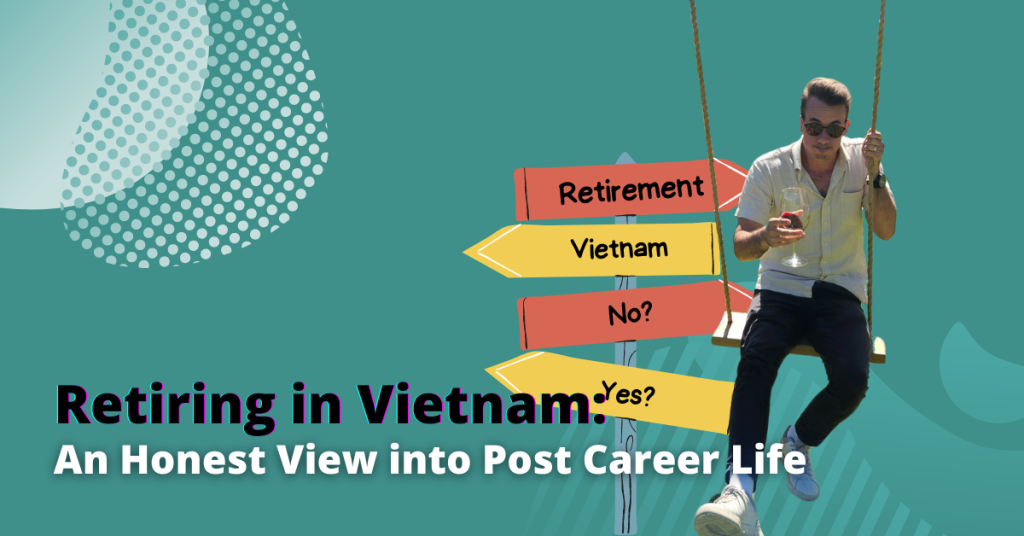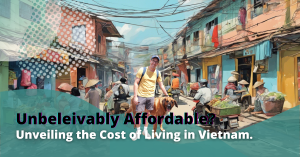Ahh, retirement. You’ve worked hard for it and now it’s time to reap your reward: kick back, relax and enjoy the fruits of your labour.
Now, imagine spending all your time in a place that offers a blissful blend of food, culture, adventure, affordability, and tranquillity. The dream! That’s the charm of retiring in Vietnam. Unfortunately, it’s not all roses.
The Appeal of Retiring in Vietnam
Vietnam, an incredible country located in the deep Southeast of Asia, has emerged as a hotspot for expats, digital nomads and retirees. Its unreal natural beauty, rich cultural heritage, and low cost of living have made retiring in Vietnam 1000’s of people’s dreams.
From incredible rice terraces to beautiful coastlines, the thrum of millions of people and motorbikes, what’s not to love? The food is incredible, the cost of living is relatively cheap and your pensions will go further than in the ‘West’.
Unfortunately, the perfect dream of retiring in Vietnam isn’t exactly as it’s cracked up to be. All the incredible advantages put aside, retiring in Vietnam can be difficult due to the Vietnamese government’s restrictive stance on retirees and the country’s lack of a retirement visa. Furthermore, while the cost of living in Vietnam might be cheap, access to good healthcare services is iffy and proper health insurance comes at a steep premium.
The following list of advantages and disadvantages of retiring in Vietnam might help you figure out if it’s right for you!
Pros of Retiring in Vietnam
- Low Cost of Living:
- Housing, food, transportation, and entertainment costs are remarkably affordable in Vietnam
- Retirement funds can stretch further, facilitating a comfortable lifestyle and the possibility of indulging in luxuries that may be unaffordable in your home country
- Excellent Healthcare System:
- Vietnam has several world-class hospitals
- Private healthcare providers are well-trained and often English-speaking
- Healthcare costs are cheaper compared to many Western countries
- Cultural Warmth:
- Vietnamese people are known for their friendliness and hospitality.
- They are welcoming to retirees, aiding in easy integration and a sense of belonging in a new environment.
Cons of Retiring in Vietnam
- Language Barrier:
- While English is commonly spoken in larger cities and tourist areas communication can still be difficult
- Traffic:
- Vietnamese cities are known for chaotic traffic conditions
- It may require an adjustment period to get accustomed to the traffic
- Healthcare Services:
- If you cannot afford international healthcare, you will likely struggle with the quality of the local medical facilities on offer
- Private Health Insurance:
- Private health insurance is expensive
- It will also likely not cover any pre-existing medical conditions
- Climate:
- Vietnam experiences a tropical climate
- Expect high temperatures and high humidity levels, particularly in the south
- Visa Considerations:
- Vietnam does not offer a retirement visa program although you may qualify for back-to-back 3-month visas
Navigating Medical Services and Health Insurance in Vietnam
Healthcare is without a doubt one of the top things you have to consider when retiring in a foreign country. You’re moving far away from family and friends who can’t all come calling at the drop of a hat. The only people you have to help are those around you, a country’s medical services and your health insurance.
Vietnam’s Medical Services
While Vietnam’s healthcare system is developing at a quick pace, there is still a vast divide between the quality of care received at government and local facilities compared to international hospitals. Some key differences between local and international medical facilities include:
- English speaking staff
- Access to direct billing with insurance
- Staff-to-patient ratio
- Quality of care
- Quality of the facilities
- Cost of treatment
Of course, there are great local medical facilities. Cho Ray Hospital, Tam Duc Heart Hospital and the Hospital for Tropical Diseases are all great and provide excellent patient care. However, apart from Cho Ray, the best local hospitals are usually specialised so they won’t be applicable to the majority of patients.
It’s also worth noting that despite their good reputations, as a Westerner you might still be shocked when it comes to the consistency of the quality of care.
For example, with nearly 3k Google reviews, Cho Ray does have a decent 3.8/5 stars. In amongst the 5-star ratings, however, you will find a few reviews like the two below.
“Do not go here, they sit you in a dirty bed that had blood and dirt on from the previous person. Not washed at all. They then put you in a room with around 100 people and don’t even care enough to give you any sort of waiting time or even talk to the patient.”
Google Review – J.J.
“This hospital is super bad and lack of communications from security, nurses to doctors. All they want is your money they don’t care about your health. Honestly, they don’t even know how to treat a patients. All of the workers there are so rude and they yelled at the patients family’s. I would not recommend this hospital.”
Google Review – N.T.
I spent 4 years in insurance in Vietnam, managing numerous accounts and several hundred lives. The vast majority of my clients who had spent any time in a local Vietnamese hospital would say that regardless of how much international hospitals cost, they wouldn’t set foot in a local hospital by choice again.
Then again, you’ll find individuals on Vietnam Expat Facebook groups maintaining that local clinics and hospitals are as good as the international facilities, especially from a cost perspective. That being said, these individuals may have been lucky and never experienced any serious medical issues where they need prolonged and serious care.
Health Insurance in Vietnam for Retirees
When you’re thinking about retiring in Vietnam, you need to remember that health insurance will likely be one of your largest expenses. And, depending on where you’re from of course (looking at you USA), you may or may not be shocked at the price.
For anyone over the age of 60, good international health insurance can cost anywhere between $3,000 to $10,000 per year depending on the provider, coverage level and geographical coverage zone. While the options won’t be endless, there are a range of regional and international insurance providers that have insurance plans suitable for retirees. Some of these providers include:
- April
- Allianz
- Cigna
- Luma
- Morgan Price
- Henner
- VUMI
- William Russell
With the above said, finding a plan that is suitable to your budget and needs may be difficult. If it’s your first time looking for private health insurance you might also not fully understand the different levels of coverage available to you and exactly what they cover.
I always recommend speaking to a highly regarded and reviewed insurance broker. Despite common misconceptions, insurance brokers don’t actually cost you any money. The good brokers also don’t try to push expensive plans on you, either. What they will be able to do, however, is to show you a bunch of options at a wide range of prices and explain coverage in detail. It’s then up to you if the health insurance, or life insurance if that’s what you’re after, is suitable for you.
Finding a trustworthy broker, on the other hand, is where things may get tricky! If retiring in Vietnam is something that you’re seriously considering, then my article on the best insurance brokers in Vietnam might help you get one step closer to reality.
Insights into the Cost of Living when Retiring in Vietnam
One of the main factors that draw retirees to Vietnam is the low cost of living. Here, you can live a comfortable lifestyle without breaking the bank. And, it’s not just hearsay. The statistics site Numbeo, found that the cost of living is roughly 56% cheaper overall than in the USA.
Housing (renting) is affordable. A decent one-bedroom apartment in the city centre can cost as little as $300 per month, while a similar apartment in a more rural area can be even cheaper. That being said, if you’re after a bit more luxury, apartments with a pool and gym etc., rent can be up towards $1,000 or even $1,400 for a one-bedroom place.
Food is another area where you can save and live cheaply. Vietnamese food is amazing and affordable. You can get a full meal eating like a local from a street vendor from anywhere between $2-$5. This will usually include your protein, carbs, vegetables, soup and iced tea. If you want to eat at a restaurant, a good Vietnamese meal can cost up towards $15-$20 if you’re in the heart of a major city.
Transportation in Vietnam is also inexpensive. Taxis, buses, and motorbike taxis are readily available and can take you around the city for a few dollars. Intercity travel can vary greatly from $15 up to $50 for more comfortable transport.
Beware of Lifestyle Creep
Despite the low cost of living, you will likely find that your expenses increase the longer you’re here. Seeking out Western comforts does come at quite the cost.
Understanding the Culture and Lifestyle in Vietnam
Living in Vietnam offers an exciting opportunity to immerse yourself in a rich and diverse culture. The Vietnamese people have a deep respect for traditions and customs, which is reflected in their daily lives.
Depending on where you retire in Vietnam, the pace of life in Vietnam can be a refreshing or a shock. The countryside and coastlines usually offer a place of calm tranquillity, whereas the major cities can provide a sense of hustle that you may not have experienced before. With approximately 100 million people in a country roughly the size of Italy, it can be hard to avoid the crowds!
You should also be prepared for a bit of a culture shock. Vietnamese customs and etiquette can be very different from what you’re used to. For many, the differences can be tough to manage, but if you are able to approach these differences with an open mind you’ll adapt nicely to Vietnam.
Is Retiring in Vietnam Right for You?
Retiring in Vietnam can be exciting, and is most definitely a unique way to spend your post career life. It offers a chance to enjoy a high standard of living at a low cost, while allowing you to immerse yourself in a new culture and beautiful country. However, it also requires you to have an open mind in order to navigate the cultural differences that you’ll face and adapt to your new lifestyle.
Healthcare is one of the major aspects that you will have to consider. Both your access to decent medical services as well as the cost of health insurance and the cost of uninsurable medical conditions.
Additionally, while you might want to retire in Vietnam, will Vietnam allow you to retire in the country? There is no retirement visa in Vietnam so you will have to find other ways to live here long-term. Whether it be running back-to-back 3-month visas or find part-time work.
In the end, whether or not retiring in Vietnam is right for you will depend on your personal preferences, lifestyle, and retirement goals. It’s important to do thorough research, make sure that your personal finances are in order and speak to a financial planner if you have to. Happy retirement planning!


